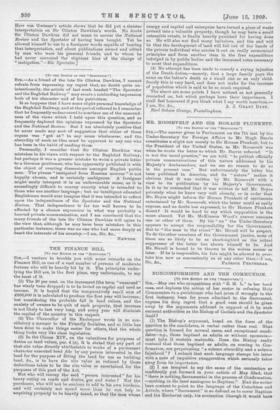MR. ROOSEVELT AND SIR HORACE PLUNKETT.
rTo THE EDITOR OP THE "SPECTATOR."'
Sin,—The answer given in Parliament on the 7th inst. by the Under-Secretary for Foreign Affairs to Mr. Hugh Barrie constitutes a slight not merely to Sir Horace Plunkett, but to the President of the United States, as Mr. Roosevelt was when he wrote the letter to which Mr. Barrie referred. "It is nob the usual practice," we are told, "to publish officially private communications of this nature addressed to his Majesty's Ambassadors, and we see no reason to do so in the present case." But unfortunately the letter has been published in America, and its "nature" makes it obvious that it was written by Mr. Roosevelt with a, view to its publication by his Majesty's Government. Is it to be contended that it was written to tell Mr. Bryce privately what he knew very well already, or in order that Mr. Bryce might inform Sir Horace Plunkett of sentiments entertained by Mr. Roosevelt, which the latter could as easily express, and no doubt has expressed, to Sir Horace Plunkett direct ? It would be hard to say which supposition is the more absurd. Yet Mr. McKinnon Wood's answer assumes one or other of them. By his " we " the Under-Secretary appears to accept the responsibility for the Government. But to "the man in the street" Mr. Birrell will be suspect. To do the other members of the Government justice, none of them are so likely to be as short-sighted as the actual suppressor of the letter has shown himself to be, And Mr. Birrell is bound to be thrown to the wolves sooner or later. If he is responsible, his fate might be allowed tp over- take him now as conveniently as at any other time.—I am,










































 Previous page
Previous page